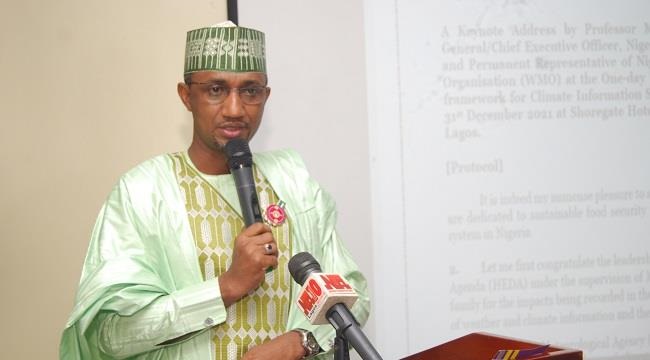The Director-General, Nigerian Meteorological Agency (NiMet), Prof. Mansur Matazu, on Thursday, October 27, 2022, charged architects to design buidings that could cope with the effects of climate change.

Matazu said this while delivering a keynote address virtually at the 2022 Association of Consulting Architects of Nigeria (ACAN) symposium and business forum in Lagos, with the theme: “Rethinking Buildings For Climate Change”.
He explained that climate change was an existential threat to mankind globally and its effects were already evident in Nigeria, ranging from temperature increase, increased rainfall variability, sea level rise, flooding, drought and desertification.
“Modern architectural slogan should be ‘designing for climate change’ as climate change would render most magnificient buildings a waste and inhabitable in future.
“Night temperature hitherto known to be minimum are becoming high, making sleep difficult and uncomfortable in most houses,” he said.
According to him, building operations are responsible for 27 per cent of Greenhouse Gasses (GHG) and the potential of the building sector as effective GHG emission reduction agent is significant.
The NiMet boss stated that the 2021 UNEP and Global Status report revealed that 27 per cent of building operations, 10 per cent of building materials and construction, and 10 per cent of other construction industry’s activities contributed to the annual global carbondioxide emission.
Matazu noted that buildings had relatively longer lifespan and action taken to reduce carbon footprint from design to construction would have the desired effect.
The professor said for climate resilient buildings, the number of hours air conditioners and bulbs were used must be reduced through the use of natural day light during the day.
“Design buildings with cross ventilation and natural gas to cool off the house, thereby reducing energy while the roof must be designed to withstand and cope with high intensity rainfall.
“ACAN members must also trade off between climate resilient buildings and climate risk fanciful buildings, while advocating that individuals and communities rethink importation of foreign designs.
“Adopt architectural designs influenced by culture, local climate and weather pattern that promote natural ventilation, air movement within the house in hot and dry climate,” he said.
He said ACAN members should take advantage of the NiMet products and services such as Wind Rose, Wind Forecast, which predicted weather conditions for proper planning of construction activities.
The DG assured that NiMet would continue to support the built environment by providing weather forecast, early warning and detection mechanism that would guide the operations of practitioners.
Matazu also urged the federal government to emphasise and approve only climate Smart Designs and Climate Smart Housing Estates (CSHE) through policy and regulation.
In his address, Mr Chikezie Nwosu, Managing Director, Watersmith Petroman Oil Ltd., said architects must work towards designing buildings with less or zero carbon emission by considering the manufacturing process and certification of materials for buildings.
Nwosu, also an engineer, stated that there must be partnership between the energy and construction industries to ensure that sustainable and renewable energy was delivered into buildings.
“While the energy sector ensures that sustainable and renewable energy is delivered into buildings, architects must ensure that the buildings’ designed are in accordance with energy efficiency and conservative guidelines,” he said.
In his welcome address, Mr Ayoola Onajide, president, ACAN Nigeria, said the symposium was organised in furtherance of the objective of promoting architectural practice at its highest level in the country.
Onajide stated the recent flooding in Nigeria, though blamed on the opening of the dams in Camereon, was a ramification of climate change.
“We are in a new world and as Architects must contribute to solving the ever important problems of climate change.
“We also strive to protect the society from quacks and unqualified architects and firms who offer services in our country without following the law and ethics of the profession,” the ACAN president said.
By Rukayat Adeyemi
